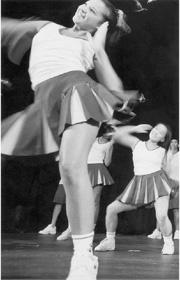EVERY CHARACTER in Yi Yi has an amusing sounding name. In the Jian family, there are Ting-Ting, the willowy teenage girl; Yang-Yang, her 8-year-old brother; mother Min-Min; and dad N.J.—who’s probably never been to New Jersey. Their pet-like monikers not only echo the lilt of the movie’s title (translated “a one and a two,” as if counting off a tempo) but make everyone seem instantly familiar, reflecting director Edward Yang’s intimate approach. Accordingly, the family’s Taipei apartment looks truly lived-in, cluttered with too-big furniture, photos, papers, and dressers strewn with cosmetics.
YI YI (A ONE AND A TWO)
directed by Edward Yang with Wu Nienjen, Kelly Lee, and Jonathan Chang runs January 19-25 at Varsity
Having consistently scrutinized modern-day, middle-class denizens of Taipei in works including A Confucian Confusion and Mahjong, Yang is one Asian director who probably doesn’t care much about crossover success. When he was a student at USC, the Taiwanese director felt burdened by Hollywood-style filmmaking and left the school after one semester. Today, it’s a bit ironic that Yi Yi, a sprawling drama that runs just a few minutes shy of three hours, has garnered the Best Director award at Cannes and popped up on several critics’ Y2K 10-best lists—positioning Yang as a major talent to be watched by stateside audiences. Yi Yi may not prove to be as popular as Ang Lee’s martial arts fantasy Crouching Tiger, Hidden Dragon, but it’s loaded with rich, appealing characters who never seem contrived.
The film opens with a less-than-storybook wedding. The groom’s mother sits sullenly by herself, perhaps unsettled by the very pregnant bride or by her loutish son’s inability to support a family. Meanwhile, her son-in-law, N.J. (Wu Nienjen), runs into his high school sweetheart, who—even after 20 years—isn’t over their breakup. Despite the wedding crowds, she shouts at him, demanding to know why he left her.
LIKE YANG’S A Confucian Confusion (1994) Yi Yi uses a kaleidoscopic narrative to track the doings of its large ensemble cast. But Yi Yi is obviously a more carefully structured work than Confusion. Despite the script’s expansiveness, its three main characters, N.J., Ting-Ting, and Yang-Yang, come into sharp focus in divergent storylines.
Ting-Ting (Kelly Lee) longs to experience first love while acting as a go-between for her next-door neighbor and a young Lothario. Meanwhile, little Yang-Yang (Jonathan Chang) keeps getting into trouble at school. Because of his kind, honest-looking face, their father N.J. is sent to Japan by his high-tech firm to negotiate a make-or-break deal. There, he also confronts his aforementioned ex-girlfriend and briefly relives their old romance.
That the film doesn’t devolve into a soap opera is due to its graceful rhythms and fine acting. Filled with impressionistic images, Yi Yi builds slowly like a real friendship. By the end, we feel we know the father, daughter, and son like members of our own family. The movie’s only real flaw is that the mother, Min-Min (Elaine Jin), is barely sketched in comparison. She suffers an emotional breakdown during the picture’s first half and heads off to a Buddhist retreat, not returning to the fold until the final act.
As the children, first-time actors Lee and Chang are delightful without being cutesy. Both play keen observers in an urban playground: Ting-Ting is entranced by the window views of her neighbors, while Yang-Yang snaps photos of people’s backs in an attempt to understand others completely and not just “half the truth.” The few scenes where their stories are deliberately paralleled with their father’s are the most eloquent illustration of generational ties I’ve seen in cinema.
“I have no magic to save your company, but your partners want a magician,” says a philosophical Japanese businessman to N.J. However, the magic of Yi Yi is that at three hours—without any kung fu heroics—its understated drama is consistently surprising and emotionally rewarding.
See also: an interview with director Edward Yang







